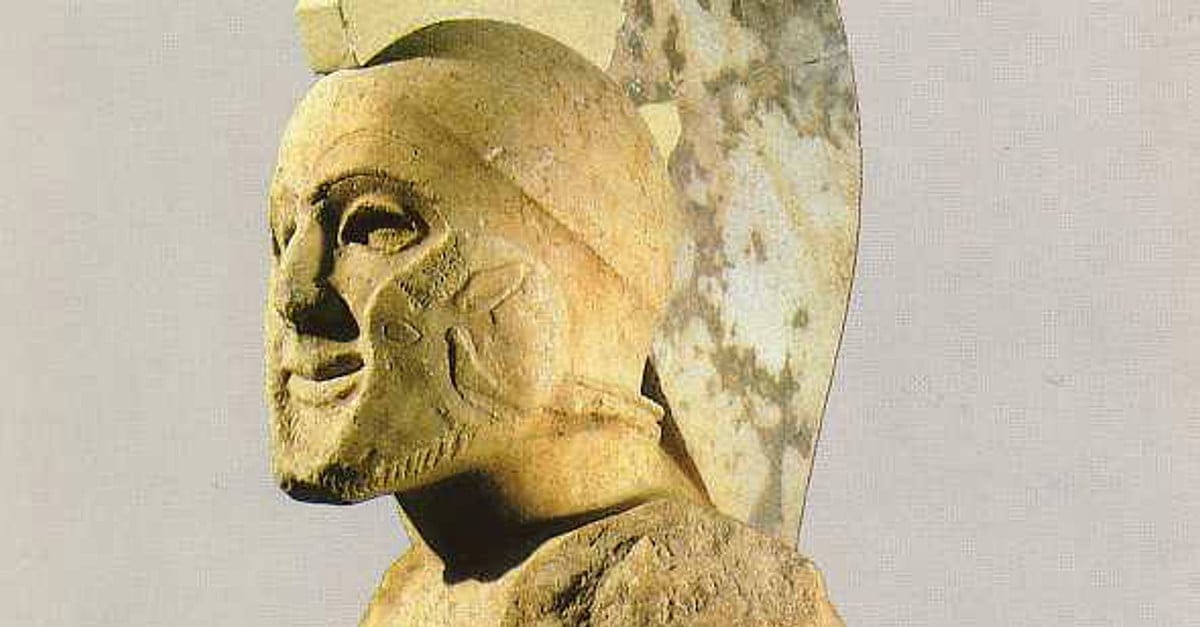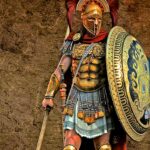While ancient Sparta is often associated with images of stoic warriors and the legendary King Leonidas, Spartan history is rich with tales of ambition, reform, and cultural exchange. One such story is that of Areus I, a king who inherited a city clinging to its past glory and dared to envision a bolder future. Ascending to the throne in 309 BC, Areus I ruled Sparta during the Hellenistic period, a time when the Greek world experienced a dramatic shift in cultural, political, and military thinking. This article explores the life and reign of this fascinating ruler, examining his military campaigns, his push for modernization, and his intriguing connections that stretched far beyond Sparta’s borders.
Areus I of Sparta biography
To understand Areus I’s impact, we need to travel back to ancient Greece, a world of competing city-states, legendary warriors, and constant power struggles. In 309 BC, Areus I, the young grandson of Cleomenes II, inherited the Spartan throne. However, his claim was immediately contested by his uncle, Cleonymus, creating a rift in the royal family. The Gerousia, Sparta’s council of elders, ultimately sided with Areus, upholding the traditional line of succession.
This early challenge likely shaped Areus I’s approach to leadership. He seemed keenly aware of the internal and external pressures facing Sparta. The rise of kingdoms like Macedon, under the rule of Antigonus Gonatas, threatened Sparta’s position in the Greek world. Areus, however, wasn’t content to simply preserve what Sparta had been; he envisioned something far greater—a Sparta reborn as a powerful Hellenistic kingdom.
To achieve this, Areus I embarked on an ambitious program of reform and expansion. He implemented changes to Sparta’s traditionally rigid economic system, recognizing the need for greater financial flexibility in a changing world. He also embraced Hellenistic military practices, recognizing that Sparta’s army, while renowned for its discipline, needed to adapt to the new realities of warfare.
These changes, however, weren’t universally embraced. Some Spartans, clinging to tradition, viewed Areus I’s reforms with suspicion. The internal struggle between those who yearned for a return to the “old ways” and those who, like Areus, saw the need for change, would become a defining characteristic of his reign.
Despite these internal challenges, Areus I led Sparta’s army in a series of significant conflicts. He fought against Antigonus Gonatas in the Chremonidean War, a conflict that pitted Macedon against a coalition of Greek city-states. He also faced the legendary Pyrrhus of Epirus during the Pyrrhic War, defending Sparta’s territory with tenacity and strategic skill.
These military campaigns cemented Areus I’s reputation as a capable and courageous leader. He proved that, even in a changing world, Spartan warriors could still fight with skill and ferocity. However, his ultimate goal—to restore Sparta to its former glory and free Greece from Macedonian control—remained elusive.
Tragically, Areus I’s reign was cut short. He died on the battlefield near Corinth in 265 BC, leaving behind a legacy of ambition, reform, and unfulfilled dreams. While he may not have achieved all of his goals, his impact on Sparta was undeniable. He had dared to push the boundaries of tradition, seeking to guide his city-state into a new era.
Who was Areus the king of Sparta?
Areus I, reigning from 309 to 265 BC, stands out among Spartan kings for his determination to propel Sparta into the Hellenistic age. He inherited a Sparta at a crossroads—a city clinging to its past glory while facing an increasingly complex and interconnected world. Recognizing the need for change, Areus I dared to challenge tradition, seeking to transform Sparta into a modern, powerful Hellenistic kingdom.
His reign was marked by a series of bold initiatives:
- Embracing Hellenistic Kingship: Areus I recognized that the traditional Spartan model of governance, with its dual kings and powerful council of elders, was becoming outdated. He sought to modernize the Spartan government, incorporating elements of Hellenistic kingship. This shift towards a more centralized and influential monarchy, however, sparked resistance from those who clung to the old ways.
- Military Innovation: Areus I understood that military strength was crucial for Sparta’s survival and resurgence. He implemented reforms aimed at modernizing the Spartan army, incorporating new tactics and technologies to better compete with rivals like Macedon and Epirus.
- Economic Reforms: Recognizing that Sparta’s rigid economic system hindered its ability to compete in the Hellenistic world, Areus I introduced reforms, including the controversial decision to mint coins. This move, while aimed at bolstering Sparta’s financial power, was seen by some as a betrayal of traditional Spartan values.
- International Diplomacy: Areus I understood that Sparta could no longer afford to remain isolated. He sought to build alliances and establish connections beyond the traditional sphere of Greek city-states. One of the most intriguing aspects of his reign is his correspondence with Jewish leaders, as documented in the First Book of Maccabees. This exchange suggests a willingness to engage with different cultures and explore new diplomatic possibilities.
Areus I’s reign ended tragically on the battlefield in 265 BC. He left behind a complex legacy—a mixture of remarkable achievements and unfinished business. He had challenged the very definition of what it meant to be a Spartan king, pushing his city-state towards a new future, even as he grappled with internal resistance and powerful external threats.
What was the religion of Sparta?
The Spartans, known for their warrior culture and unwavering discipline, were deeply religious people. Their beliefs and practices were intricately woven into the fabric of everyday life, shaping their laws, social customs, and, of course, military strategies.
Like other ancient Greeks, the Spartans worshipped a pantheon of gods and goddesses. However, their religious practices had their own distinct flavor, reflecting their unique cultural values and societal structure:
- Zeus, the Protector: While Zeus, the king of the gods, was revered throughout Greece, he held a special place in the Spartan pantheon. They viewed him as the protector of their city-state, the ultimate guarantor of their laws, and the bestower of victory in battle. The Spartans honored Zeus with a magnificent temple on the Acropolis, a testament to his importance in their lives.
- Honoring the Gods Through Festivals: Festivals played a crucial role in Spartan religious life. One of the most important was the Hyakinthia, a ten-day festival honoring both Apollo and Hyacinthus, a figure from Spartan mythology. The Hyakinthia featured a unique blend of religious rituals, athletic competitions, music, and dancing, reflecting the Spartans’ emphasis on physical prowess and communal unity.
- Seeking Divine Guidance: The Spartans placed great importance on divination, seeking to understand the will of the gods and receive guidance on important matters. They consulted oracles, such as the famous oracle at Delphi, and paid close attention to signs and omens, believing that the gods were constantly communicating with them, especially before major decisions like going to war or implementing new laws.
- Warfare and Religion: For the Spartans, warfare was more than just a strategic exercise; it was a deeply spiritual endeavor. They believed their success on the battlefield depended on the favor of the gods, particularly Ares, the god of war. Before marching into battle, Spartans would offer sacrifices and prayers, seeking divine protection and guidance. Their military victories were seen as evidence of divine favor, while defeats were often attributed to having displeased the gods in some way.
It’s important to note that our understanding of Spartan religion is continually evolving, shaped by new archaeological discoveries and interpretations of ancient texts. However, it’s clear that religion was not merely a separate aspect of Spartan life; it was the foundation upon which their society was built, influencing every aspect of their world.
What is Sparta called today?
The ancient city of Sparta, once the heart of a powerful military state, may be long gone, but its legacy lives on in the modern town of Sparti. Established in 1834 by King Otto of Greece, Sparti stands as a testament to the enduring power of the Spartan spirit.
While Sparti may not be an exact replica of its ancient predecessor, it embodies the spirit of resilience and adaptation that defined the Spartans. Located in the southern Laconia region of Greece, Sparti is a thriving hub, blending modern industry with fascinating historical sites:
- A Modern City with Ancient Roots: Sparti seamlessly blends its ancient past with its present-day identity. Visitors can explore the ruins of ancient Sparta, walk in the footsteps of legendary warriors, and then enjoy the amenities of a bustling modern town.
- A Center of Industry: Sparti is a significant center for agricultural processing, particularly citrus fruits and olives, reflecting the region’s rich agricultural heritage. The town also boasts a diverse economy, with industries ranging from textiles to tourism.
- A Window into the Past: History enthusiasts flock to Sparti to explore the remnants of ancient Sparta. While the ruins may not be as extensive as those found at other ancient Greek sites, they offer a tangible link to a civilization that has captivated imaginations for centuries.
Sparti stands as a powerful reminder that while civilizations may rise and fall, their stories continue to resonate through time. It’s a place where the echoes of the past mingle with the vibrancy of the present, creating a unique and captivating destination.
Key Takeaways:
- Visit Sparti to experience the modern-day legacy of ancient Sparta.
- Founded in 1834, Sparti embodies the spirit of ancient Sparta while forging its own identity.
- Sparti demonstrates how a city can evolve while honoring its historical roots, becoming a blend of old and new.
Was King Leonidas Real?
The story of King Leonidas and his 300 Spartans, bravely facing the overwhelming might of the Persian army at the Battle of Thermopylae, has become the stuff of legend. But was this courageous king a real historical figure or simply a mythical hero?
Historical evidence confirms that King Leonidas was indeed a real person. He ruled Sparta, one of the most powerful Greek city-states, from roughly 490 to 480 BC. Historians believe he was the 17th king of the Agiad dynasty, a lineage that claimed descent from the mythical hero Heracles.
Leonidas’s most enduring legacy is undoubtedly his role in the Battle of Thermopylae. In 480 BC, the Persian King Xerxes launched a massive invasion of Greece, seeking to conquer the Greek city-states and add them to his vast empire. Leonidas, understanding the gravity of the threat, rallied a force of 300 Spartans and a contingent of soldiers from other Greek cities to confront the Persians at Thermopylae.
Thermopylae, a narrow pass, was a strategic chokepoint, offering the Greeks a defensive advantage against the much larger Persian army. For days, Leonidas and his troops held off the Persians, inflicting heavy casualties and displaying unwavering courage. However, the Persians eventually discovered a mountain path that allowed them to outflank the Greeks.
Facing certain defeat, Leonidas ordered most of his remaining allies to retreat. He remained at Thermopylae with his 300 Spartans and a small contingent of Thespian soldiers, determined to fight to the death. The Spartans, true to their reputation, fought with unmatched ferocity but were ultimately overwhelmed.
Though a military defeat, the stand at Thermopylae became a pivotal moment in Greek history. The bravery and sacrifice of Leonidas and his Spartans served as a rallying cry for the Greek city-states, inspiring them to unite against the Persian threat. The Greeks would ultimately defeat the Persians in subsequent battles, preserving their independence.
While Leonidas’s existence as a historical figure is not disputed, some details of his life remain shrouded in mystery. Much of what we know about him comes from the writings of ancient Greek historians, particularly Herodotus, who provided a detailed account of the Battle of Thermopylae. Despite the gaps in our knowledge, Leonidas’s bravery, leadership, and willingness to sacrifice himself for the greater good have cemented his place as one of the most iconic figures in military history.
Who was the most famous king of Sparta?
While Leonidas, glorified by his last stand at Thermopylae, might hold the title of Sparta’s most famous king, Areus I stands out as perhaps the city-state’s most consequential ruler. Ascending to the throne in 309 BC, Areus I inherited a Sparta struggling to find its place in a rapidly evolving Greek world. He responded with a series of bold and often controversial reforms, aiming to transform Sparta into a major power in the Hellenistic era.
Areus I’s reign was shaped by a deep understanding of the challenges facing his city-state:
- The Rise of New Powers: The old world of independent Greek city-states was giving way to powerful kingdoms like Macedon and Epirus. Areus I recognized that Sparta, clinging to its traditional ways, risked becoming irrelevant.
- The Emergence of Hellenistic Culture: The conquests of Alexander the Great had unleashed a wave of cultural exchange and innovation across the Greek world. Areus I embraced aspects of this Hellenistic culture, recognizing that Sparta needed to adapt to survive.
- Internal Resistance to Change: While Areus I saw the need for modernization, many Spartans, particularly within the ruling class, resisted any challenge to tradition. Navigating this internal resistance became a defining aspect of his reign.
Areus I’s efforts to revitalize Sparta were ambitious and multifaceted:
- Military Modernization: He introduced reforms to the Spartan army, incorporating new tactics and technologies to keep pace with evolving military strategies.
- Economic Reforms: Areus I recognized that Sparta’s rigid economic system, based on iron bars rather than coinage, put it at a disadvantage. He took the unprecedented step of minting silver coins, a decision that shocked traditionalists but demonstrated his willingness to challenge long-held beliefs.
- Diplomatic Outreach: He understood the need for alliances and strategic partnerships. His outreach to Jewish leaders, as evidenced by letters mentioned in the First Book of Maccabees, highlights his willingness to engage with non-Greek powers.
Areus I’s reign was cut short by his death in battle in 265 BC. While he may not have fully realized his vision of a revitalized Sparta, his impact was undeniable. He pushed the boundaries of tradition, challenging Spartans to adapt to a changing world. His legacy lies not only in his military achievements but also in his willingness to embrace innovation and forge a new path for his city-state.
Key Takeaways:
- Areus I reigned from 309 to 265 BC. He belonged to the Agiad dynasty, one of the two royal families that shared power in Sparta’s unique system.
- He aimed to restore Sparta to its former glory. He recognized that to compete with powerful rivals like Macedon and Epirus, Sparta needed to modernize and adapt.
- Areus I embraced Hellenistic culture. He wasn’t afraid to introduce new ideas and practices, even if they challenged Spartan traditions.
- He faced internal resistance to his reforms. Many within the Spartan elite opposed his changes, leading to political tensions.
- Areus I’s legacy is one of ambition and change. He demonstrated that Sparta could evolve and remain relevant in a changing world, even if his efforts ultimately fell short of achieving their full potential.
Which King Betrayed Sparta?
The Hellenistic period was a tumultuous time for the Greek city-states as they navigated the aftermath of Alexander the Great’s empire and the rise of new regional powers. Sparta, under the rule of Areus I, found itself caught in this web of shifting alliances and ambitions. While Areus I strove to strengthen Sparta and restore its former glory, his reign was plagued by internal conflict that some believe weakened his position and contributed to Sparta’s struggles.
At the heart of this potential betrayal lies the figure of Cleonymus, Areus I’s uncle and rival. Cleonymus, believing he had a rightful claim to the Spartan throne, resented Areus I’s ascension to power. This resentment festered, eventually leading Cleonymus to make a fateful decision that would have far-reaching consequences for Sparta.
Driven by ambition and perhaps a desire for revenge, Cleonymus allied himself with Antigonus Gonatas, the king of Macedon and one of Areus I’s primary rivals. This betrayal cut deep, for it pitted Cleonymus directly against his own city-state and the king he sought to undermine.
Cleonymus’s motives remain a subject of debate among historians:
- Personal Ambition: Some argue that Cleonymus’s actions were driven solely by self-interest. He craved power and was willing to betray his own people to achieve it, even if it meant aligning himself with Sparta’s enemies.
- Political Calculation: Others propose that Cleonymus might have believed that siding with Antigonus was ultimately in Sparta’s best interest. Perhaps he saw this alliance as a way to secure Sparta’s position in a changing world, even if it meant sacrificing his nephew’s rule.
- A Pawn in a Larger Game: It’s also possible that Cleonymus was manipulated by Antigonus, used as a tool to destabilize Sparta from within. Antigonus, a shrewd and ambitious ruler, likely recognized that internal divisions within Sparta would weaken Areus I’s position, making it easier to exert Macedonian influence.
Regardless of his motivations, Cleonymus’s betrayal had a significant impact on Sparta:
- Internal Weakening: The conflict between Areus I and Cleonymus divided the Spartan elite, diverting resources and attention away from Areus I’s efforts to strengthen Sparta. This internal strife likely emboldened Sparta’s enemies, who saw an opportunity to exploit these divisions.
- Undermining of Areus I’s Authority: Cleonymus’s alliance with Antigonus undermined Areus I’s authority, portraying him as vulnerable to challenges from within. This likely made it more difficult for Areus I to build alliances and pursue his ambitious agenda.
- Long-Term Consequences: The wounds inflicted by Cleonymus’s betrayal likely had lasting consequences. Even if Areus I had lived longer, overcoming the damage caused by this internal strife would have been a formidable challenge.
The story of Cleonymus serves as a cautionary tale about the corrosive effects of ambition and betrayal. It highlights how internal divisions can weaken even the most powerful of states, leaving them vulnerable to external threats.
Who were the king of Sparta?
Sparta, known for its unique social structure and military prowess, also possessed an unusual system of governance—a diarchy, meaning “rule by two.” Instead of a single king, Sparta had two kings ruling simultaneously.
This dual kingship was deeply rooted in Spartan tradition. The two kings came from two distinct royal families:
- The Agiads: This lineage claimed descent from the mythical hero Heracles through his son, Eurysthenes.
- The Eurypontids: This family traced their ancestry back to Procles, the twin brother of Eurysthenes.
The reasons behind this dual kingship are complex and not fully understood. However, scholars suggest several potential explanations:
- Balance of Power: Having two kings likely served as a check on power, preventing any one individual from becoming too dominant. Each king could scrutinize the other’s actions, ensuring that neither abused their authority.
- Continuity of Leadership: With two kings, Sparta was assured of having a ruler available in times of war or crisis, even if one king was away leading the army or engaged in other duties.
- Religious Significance: The dual kingship may have had religious or symbolic importance, representing a balance between different aspects of Spartan society or a connection to their mythical past.
The responsibilities of the two kings were not always clearly defined and likely evolved over time. However, some general principles seem to have applied:
- Military Leadership: Often, one king would lead the Spartan army in battle, while the other remained in Sparta to manage affairs at home. The king who went to war was typically chosen by the Gerousia, Sparta’s council of elders, based on factors such as experience and leadership qualities.
- Religious Duties: Both kings held important religious roles, presiding over festivals and making offerings to the gods. They were seen as intermediaries between the gods and the Spartan people.
- Judicial Authority: The kings played a role in the Spartan judicial system, hearing cases and resolving disputes. Their judgments, however, were not absolute and could be challenged.
The Spartan diarchy is a fascinating example of how a society sought to create a system of governance that balanced power, tradition, and practicality. While it may seem strange from a modern perspective, it endured for centuries, shaping the political landscape of one of ancient Greece’s most powerful city-states.
Who is the mythical king of Sparta?
While Sparta boasted a long line of historical kings, certain figures from their mythical past loom large in the Spartan imagination, shaping their values and identity. Among these figures, Menelaus, the husband of Helen of Troy, stands out as a pivotal mythical king.
Menelaus’s story is intricately woven into the epic tale of the Trojan War, as recounted in Homer’s Iliad and Odyssey.
- The Abduction of Helen: According to Greek mythology, Helen, Menelaus’s wife, was considered the most beautiful woman in the world. Paris, a prince of Troy, abducted Helen, sparking a conflict that would engulf Greece and Troy in a decade-long war.
- Menelaus’s Quest for Vengeance: The abduction of his wife ignited Menelaus’s fury. He rallied the Greeks, led by his brother, Agamemnon, and launched a massive expedition to Troy to reclaim Helen and seek revenge for the insult inflicted upon him.
- A Warrior King: Depicted as a skilled warrior and a respected leader, Menelaus played a crucial role in the Trojan War. He fought bravely on the battlefields of Troy, ultimately helping to bring about the city’s downfall.
- A Journey Home: Following the fall of Troy, Menelaus faced a perilous journey home, beset by storms and other challenges. His adventures, recounted in the Odyssey, highlight his resilience and resourcefulness.
While Menelaus’s story is steeped in mythology, it’s essential to remember that for the Spartans, the line between myth and history was often blurred.
- Shaping Spartan Values: The mythical figure of Menelaus, with his emphasis on honor, duty, and martial prowess, resonated deeply with Spartan values. His story served as a powerful reminder of the importance of protecting one’s family and homeland, even at great cost.
- A Symbol of Spartan Identity: Menelaus, as a legendary king of Sparta, became a symbol of Spartan identity, connecting them to a heroic past. His image appeared on coins and other artifacts, solidifying his place in the Spartan imagination.
It’s crucial to recognize that the Spartans didn’t necessarily view mythical figures like Menelaus as literal historical figures in the way we might today. Instead, these figures represented archetypes, embodying ideals and values that the Spartans sought to emulate.
Key Takeaways:
- Menelaus, while a mythical figure, played a significant role in shaping Spartan identity and values.
- The story of the Trojan War, with Menelaus at its center, underscored themes of honor, duty, and vengeance—concepts deeply ingrained in Spartan culture.
- The Spartans often blurred the lines between myth and history, drawing inspiration and guidance from their mythical past.
Who was the most important god in Sparta?
The Spartans, renowned for their warrior culture and unwavering discipline, held a deep reverence for the gods, believing that their favor was crucial for success in battle and prosperity in peace. While they worshipped a pantheon of Greek deities, Zeus, the king of the gods, occupied a preeminent position in their belief system.
- Zeus, the Protector: To the Spartans, Zeus was more than just the ruler of the heavens; he was the protector of their city, the guarantor of their laws, and the source of their military strength. They believed that their victories on the battlefield were a direct result of his favor and that their laws and social order were divinely sanctioned by him.
- Honoring Zeus: The Spartans honored Zeus with a magnificent temple on the Acropolis, a testament to his importance in their lives. They offered him sacrifices, both animal and agricultural, to express their gratitude and seek his continued blessings. They also dedicated festivals and athletic competitions to him, recognizing his association with strength, victory, and leadership.
- Seeking Divine Favor: Before marching into battle, Spartan soldiers would pray to Zeus, seeking his guidance and protection. They believed that their courage and discipline were divinely inspired and that their successes were a testament to his favor.
While Zeus was undoubtedly the most important god in the Spartan pantheon, other deities played significant roles in their religious practices:
- Athena: The goddess of wisdom, strategy, and warfare, Athena was highly revered in Sparta. The Spartans associated her with the strategic planning and discipline that characterized their military prowess.
- Ares: As the god of war, Ares held a special place in the hearts of Spartan warriors. They admired his ferocity and strength, believing that he could grant them courage and ferocity in battle.
- Artemis: The twin sister of Apollo, Artemis was the goddess of the hunt, wilderness, and childbirth. The Spartans respected her connection to the natural world and her role in protecting women and children.
The importance of religion in Spartan life cannot be overstated. Their beliefs shaped their worldview, influencing everything from their laws and social customs to their military strategies and personal interactions. To understand the Spartans, one must delve into the world of their gods, for it was in the divine realm that they found justification for their way of life and the inspiration to face their enemies without fear.
Who were the two kings of Sparta?
One of the most unique aspects of Spartan society was its dual kingship, where two kings ruled concurrently. This system, known as a diarchy, set Sparta apart from other Greek city-states and played a crucial role in shaping its political and social structures.
The two royal families from which the kings were drawn were:
- The Agiads: This dynasty claimed descent from the mythical hero Heracles through his twin sons, Eurysthenes and Procles. The Agiads were considered the senior royal family, their lineage stretching back to the very founding of Sparta.
- The Eurypontids: Also claiming descent from Heracles, the Eurypontids traced their lineage back to Procles. While considered the junior dynasty, the Eurypontids held equal power to the Agiads, ensuring a balance of authority.
The origins of this dual kingship system remain shrouded in mystery. However, several theories attempt to explain its emergence:
- Preventing Tyranny: Having two kings likely served as a check on power, preventing one individual from accumulating too much authority. This system ensured a level of accountability and reduced the risk of tyranny.
- Ensuring Continuity: With two kings, Sparta was assured a leader in times of war or crisis, even if one was away leading the army or incapacitated.
- Reflecting Social Divisions: Some scholars suggest that the dual kingship may have reflected early social divisions within Spartan society, each king representing a different faction or clan.
The responsibilities of the two kings were fluid and likely evolved over time. However, they generally held authority in the following areas:
- Military Leadership: Kings often took turns leading Spartan armies in battle, their military prowess a key aspect of their authority. The king chosen for a particular campaign was often selected by the Gerousia, the Spartan council of elders, based on factors like experience, lineage, and perceived favor with the gods.
- Religious Duties: Both kings held important religious roles, performing sacrifices, presiding over festivals, and acting as intermediaries between the gods and the Spartan people. Their religious duties reinforced their legitimacy and strengthened their bond with their subjects.
- Judicial Authority: The kings also served as judges, resolving disputes and upholding Spartan laws. However, their judicial power was not absolute and could be challenged by other institutions, such as the ephors, who held significant authority in Spartan society.
The Spartan diarchy, while unusual, proved remarkably resilient, enduring for centuries and shaping the political landscape of one of ancient Greece’s most powerful city-states. It serves as a testament to the Spartan’s ability to create a system that balanced tradition, power, and pragmatism, ensuring, at least in theory, that no single individual could become too dominant.
Who is the mythical king of Sparta?
While Sparta had a long line of historical kings, their mythical past is intertwined with the legendary figure of Menelaus, a king whose story resonated deeply with Spartan values and identity. Menelaus, the husband of Helen and a central figure in the Trojan War, embodies the Spartan ideals of honor, duty, and vengeance.
The story of Menelaus is forever entwined with the epic tale of the Trojan War:
- The Abduction That Sparked War: Menelaus was married to Helen, a woman renowned throughout Greece for her beauty. Paris, a prince of Troy, abducted Helen, igniting a war that would consume both Greece and Troy.
- A Quest for Justice: The abduction of his wife enraged Menelaus, who called upon the Greek leaders to help him avenge this insult and reclaim Helen. His brother, Agamemnon, led the Greek forces against Troy in a conflict that would last a decade.
- A Warrior King on the Battlefield: Menelaus, depicted as a courageous and skilled warrior, played a vital role in the Trojan War. He fought bravely alongside the other Greek heroes, seeking to reclaim his honor and punish those who had wronged him.
- A Perilous Journey Home: After the fall of Troy, Menelaus faced a long and arduous journey back to Sparta. His adventures, detailed in Homer’s Odyssey, highlight his resilience, resourcefulness, and unwavering determination.
Though a mythical figure, Menelaus held a powerful place in the Spartan imagination:
- Embodying Spartan Ideals: Menelaus embodied many of the core values at the heart of Spartan society: honor, duty, martial prowess, and an unwavering commitment to justice. His story served as a reminder of the importance of protecting one’s family, homeland, and reputation, even in the face of overwhelming odds.
- A Link to a Heroic Past: Menelaus, as a legendary king of Sparta, connected the Spartans to a heroic past. His image appeared on coins and other artifacts, solidifying his place in their collective memory.
It’s important to note that the Spartans likely did not view mythical figures like Menelaus as purely fictional characters. Instead, they saw them as embodiments of ideals and values, figures who offered guidance and inspiration. The line between myth and history, for the Spartans, was often blurred. They drew strength and purpose from their mythical past, finding in these stories lessons for navigating the complexities of their own lives.
Who was the most important god in Sparta?
The Spartans, renowned for their warrior culture and strict societal structure, were deeply religious people. Their pantheon of gods mirrored that of other ancient Greeks, but certain deities held particular significance for the Spartans, shaping their values, customs, and approach to life.
At the forefront of the Spartan pantheon stood Zeus, the king of the gods. He was more than just a distant deity; he was the protector of their city, the upholder of their laws, and the source of their military might.
- Zeus, the Guarantor of Spartan Order: The Spartans believed their unique social order and strict laws were divinely sanctioned by Zeus. They viewed their victories in battle as evidence of his favor and their defeats as signs of his displeasure.
- Honoring the King of the Gods: The Spartans built a magnificent temple to Zeus on the Acropolis, a testament to his importance in their lives. They offered him sacrifices, both animal and agricultural, to appease him and secure his blessings. Festivals and athletic competitions were also dedicated to Zeus, recognizing his association with strength, victory, and leadership.
- Seeking Divine Guidance in War: Before marching into battle, Spartan soldiers would pray to Zeus, seeking his protection and guidance. Their courage, discipline, and ferocity in battle were seen as manifestations of his favor.
While Zeus reigned supreme in the Spartan pantheon, other gods held important roles:
- Athena: The goddess of wisdom, strategic warfare, and craft, Athena was highly revered by the Spartans. They associated her with the discipline, strategic thinking, and skill that formed the backbone of their military prowess.
- Ares: As the god of war, Ares represented the raw, unbridled aspects of combat. The Spartans respected his power and ferocity, believing he could grant them strength and courage on the battlefield.
- Artemis: The twin sister of Apollo and goddess of the hunt, wilderness, and childbirth, Artemis was also venerated by the Spartans. They recognized her connection to the natural world, a world they interacted with through their rigorous training regimes, and her role in protecting women and children.
Religion was not merely a separate sphere of life for the Spartans; it permeated every aspect of their existence. Their gods were ever-present, their favor constantly sought. To understand the Spartan mentality, their unwavering discipline, and their unflinching approach to warfare, one must understand their relationship with the divine, a relationship that shaped their world view and dictated their actions.
- Georgia Platform: A Southern Strategy, 1850s - March 31, 2025
- How many weeks is 40 days: Quick Conversion Guide for Accurate Results - March 31, 2025
- How many feet is 300 meters? 984 Feet: Understand Length Conversions Easily - March 31, 2025
















